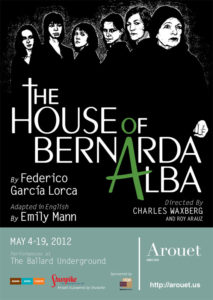Ok, this is a bit late for Thanksgiving, yet I believe one should be thankful all the time. I also believe in being thankful for the past as much as for what the future has yet to bring. Inspired by The Producer’s Perspective post 7 Theater things I’m thankful for this Thanksgiving, here are six of mine:
- The Gene Pool. A show on the bucket list, a dream cast, and mostly positive reviews made this an excellent way to kick-off Arouet’s first year.
- ACT, A Contemporary Theatre. Their support to the local theatre community as not only producers of locally cast professional shows, but as an incubator for smaller companies and independent artists has turned them into a model other regional companies across the country are following.
- The Economy. As odd as it might sound, I believe the current economic climate has forced us to reevaluate how we do theater and to become more creative with less financial resources. People will go out to the theatre, they are just more particular about what they go to see.
- Seattle Theatre: What’s Next. Brought together by the Intiman implosion and the economy, Seattle theatre artists have come together to meet, discuss, and come up with an action plan on what we need to do as a community.
- Friendly Theatre Venues. Seattle is full of them, and for that I am grateful. I loved working with the excellent folks at Annex Theatre so much that I raved about them earlier this year, and so far dealing with Ghostlight Theatricals/The Ballard Underground has been quite easy. They are not just a venue to rent, they make you feel like part of the bigger picture.
- Opportunities Yet to Come. The year ahead is full of possibilities and new opportunities. Arouet is producing it’s most ambitious project in The House of Bernarda Alba followed by the premiere production of a new play BBQ, personally I am involved in various capacities in four different theatre companies, and I don’t know yet what other directing gigs could come my way. It’s going to be an eventful one.


